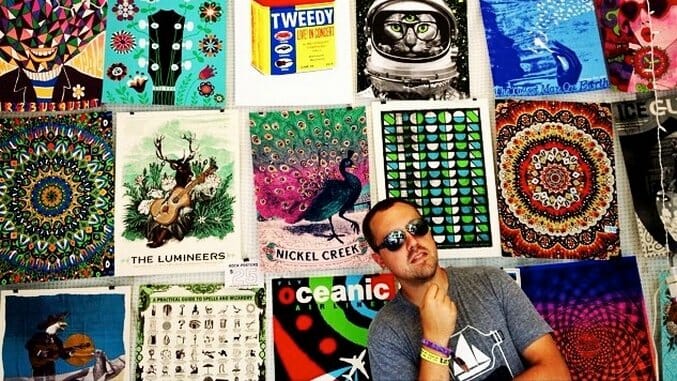Designer Nate Duval: Beyond the Merch Table
Photo courtesy of Nate Duval
Nate Duval had been designing concert posters for a few years when he got a particularly high-profile commission: the opening date on Phish’s first tour since the Vermont band had ended a five-year hiatus. As an added bonus for Duval, a Massachusetts native, Phish was kicking things off at Fenway Park in Boston.
“Growing up in Massachusetts as a lifelong Red Sox fan, it was almost surreal to have that be my first Phish poster,” says Duval, whose poster depicts a Boston terrier framed by a baseball diamond and wearing a Red Sox jersey, with the band name arcing overhead in a version of the team’s typeface.
It’s one of an estimated 400 concert posters that Duval, 33, has created over the past decade for acts including Wilco, the Black Keys, Spoon, Alabama Shakes and many more. He has also designed band T-shirts, album art and beer labels for breweries, and done illustrations for book jackets, the apparel company Patagonia, Whole Foods and Sweet’n Low.
“All these rock posters, they started off as an artistic release from my day job after college and they eventually turned into giant business cards that allow me to keep doing what I want to do for a living,” Duval says.
There were actually two day jobs after Duval graduated in 2004 from Syracuse University, where he studied advertising design. He moved back to western Massachusetts, where he grew up, and went to work as the in-house designer for Blue Q, purveyor of what Duval calls “artfully designed gift products,” in Pittsfield. Much of his role there involved working on the back end of the business, photographing products and creating sell sheets for them. The year he spent with the company was instructive.
“I learned that making and selling things was a possibility for a living,” says Duval, who left and took a part-time job to get by while he pursued his own work. He started making posters and fliers for the Northampton, Mass., concert promoter Iron Horse Entertainment Group. He also began designing posters for bands in the area, which at the time included the alt-rock group Apollo Sunshine and, a little farther afield, Boston jazz-fusion trio the Slip.
Eventually, he did a poster for a Decemberists show in Northampton, which led to more work through the band’s management company, and then for other acts—enough that Duval was able to quit the part-time gig.
He’s stayed plenty busy since, estimating that he averages 50 posters a year, along with other projects, while running a business that has reduced the amount of time he gets to spend on actually creating art to just a day or two a week. “I’m a one-man show, so if you order something from my website, I’m the one who packages and ships it to you,” Duval says.
-

-

-

-

-

-

-

-

-

-

-

-

-

-

-

-

-

-

-

-

-

-

-

-

-

-

-

-

-

-

-

-

-

-

-

-

-

-

-

-








































